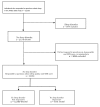Association between Neighborhood Environment and Quality of Sleep in Older Adult Residents Living in Japan: The JAGES 2010 Cross-Sectional Study
- PMID: 32098114
- PMCID: PMC7068387
- DOI: 10.3390/ijerph17041398
Association between Neighborhood Environment and Quality of Sleep in Older Adult Residents Living in Japan: The JAGES 2010 Cross-Sectional Study
Abstract
Poor sleep is associated with lifestyle, however, few studies have addressed the association between sleep quality and the neighborhood environment. This study aimed to investigate the associations between living environment factors and sleep quality in older people. Participants were community-dwelling people aged ≥65 years who participated in the 2010 Japanese Gerontological Evaluation Study. The data of 16,650 people (8102 men, 8548 women) were analyzed. Sleep quality (good or poor) was evaluated using a self-administered questionnaire. Multilevel Poisson regression analysis stratified by depressive status (measured by the Geriatric Depression Scale-15 [GDS]) was conducted with sleep quality as the dependent variable and social and physical environmental factors as explanatory variables. The 12,469 non-depressive respondents and 4181 depressive respondents were evaluated. The regression analysis indicated that non-depressive participants slept better if they lived in environments with few hills or steps (prevalence ratio [PR] = 0.75, 95% CI: 0.56-0.9) and with places where they felt free to drop in (PR = 0.51, 95% CI: 0.26-0.98). For depressive participants, these associations were not evident. Living alone, poor self-rated health, low income, and unemployment were associated with poor sleep quality. In addition to support with these individual factors, improving environmental factors at the neighborhood level may improve the sleep quality of community-dwelling older adults.
Keywords: multilevel Poisson regression; older adults; physical environment; sleep quality; social environment.
Conflict of interest statement
The authors declare no conflict of interest.
Figures


Similar articles
-
Neighborhood support network, perceived proximity to community facilities and depressive symptoms among low socioeconomic status Chinese elders.Aging Ment Health. 2016;20(4):423-31. doi: 10.1080/13607863.2015.1018867. Epub 2015 Mar 16. Aging Ment Health. 2016. PMID: 25775108
-
Development of an instrument for community-level health related social capital among Japanese older people: The JAGES Project.J Epidemiol. 2017 May;27(5):221-227. doi: 10.1016/j.je.2016.06.005. Epub 2017 Feb 4. J Epidemiol. 2017. PMID: 28169107 Free PMC article.
-
Differences in depressive symptoms by rurality in Japan: a cross-sectional multilevel study using different aggregation units of municipalities and neighborhoods (JAGES).Int J Health Geogr. 2021 Sep 26;20(1):42. doi: 10.1186/s12942-021-00296-8. Int J Health Geogr. 2021. PMID: 34565381 Free PMC article.
-
Are neighborhood bonding and bridging social capital protective against depressive mood in old age? A multilevel analysis in Japan.Soc Sci Med. 2015 Jan;124:171-9. doi: 10.1016/j.socscimed.2014.11.042. Epub 2014 Nov 20. Soc Sci Med. 2015. PMID: 25461874
-
Relative deprivation, poverty, and subjective health: JAGES cross-sectional study.PLoS One. 2014 Oct 28;9(10):e111169. doi: 10.1371/journal.pone.0111169. eCollection 2014. PLoS One. 2014. PMID: 25350284 Free PMC article.
Cited by
-
Association between sleep quality and living environment among Chinese older persons: a cross-sectional study.Sleep Biol Rhythms. 2024 Jan 17;22(3):323-331. doi: 10.1007/s41105-023-00510-z. eCollection 2024 Jul. Sleep Biol Rhythms. 2024. PMID: 38962791 Free PMC article.
-
Associations of insomnia with noise annoyance and neighborhood environments: A nationwide cross-sectional study in Japan.Prev Med Rep. 2021 May 29;23:101416. doi: 10.1016/j.pmedr.2021.101416. eCollection 2021 Sep. Prev Med Rep. 2021. PMID: 34150475 Free PMC article.
-
Neighborhood Built Environment and Sleep Health: A Longitudinal Study in Low-Income and Predominantly African-American Neighborhoods.Am J Epidemiol. 2023 May 5;192(5):736-747. doi: 10.1093/aje/kwad016. Am J Epidemiol. 2023. PMID: 36691683 Free PMC article.
-
Prediction of physiological status, community participation, and daily activity function to sleep quality for outpatient dynapenic older people.BMC Geriatr. 2025 Jan 11;25(1):26. doi: 10.1186/s12877-024-05622-w. BMC Geriatr. 2025. PMID: 39799279 Free PMC article.
-
Perceived Neighborhood Characteristics and Sleep in Australian Adults.Health Educ Behav. 2024 Feb;51(1):155-166. doi: 10.1177/10901981231177687. Epub 2023 Jun 12. Health Educ Behav. 2024. PMID: 37306016 Free PMC article.
References
Publication types
MeSH terms
LinkOut - more resources
Full Text Sources
Research Materials

